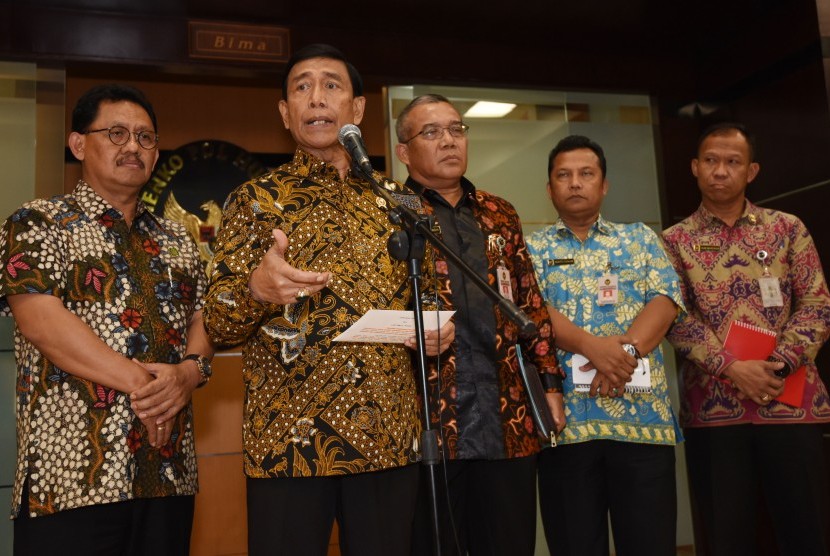By : Erlangga Pratama *)
REPUBLIKA.CO.ID, The government decided to ban the hard-line Hizbut Tahrir Indonesia (HTI) group on the grounds. The ban recommendation, if passed by a court, would be the second time the government banned the activities of religious minorities in the country. President Joko "Jokowi" Widodo's administration banned earlier the Fajar Nusantara Movement (Gafatar) and evicted members of the group from their settlement in Mempawah, West Kalimantan.
Coordinating Political, Legal and Security Affairs Minister Wiranto announced that the government was set to ban the HTI because the group promoted “anti-Pancasila” ideologies and beliefs that contravened the Constitution. One of purpose from this decision is to comprehensively examine all mass organizations in the country, a move taken amid growing radicalism in Indonesia. “HTI has also promoted values that contradict Pancasila and the 1945 Constitution. The activities of the group have also collided with the public, thus poses a threat to the unity of the republic of Indonesia. For this reason, the government has decided to ban the HTI,” Wiranto said, quoted by media. After that, pro and contra against government’s decision has spreaded.
However, the law regulates lengthy procedures, including the issuance of warnings and temporary suspensions, before a request to disband a mass organization can be filed with the court. The HTI claimed it had yet to receive a warning from the government.
Rights groups have urged the government to respect the legal procedures stipulated in the 2013 Mass Organizations Law following its announcement to ban hard-line Islamist group Hizbut Tahrir Indonesia (HTI). Activists have also called on the government to make sure freedom of expression was not compromised.
Setara Institute chairman Hendardi said he supported the government’s move to ban mass organizations deemed to promote beliefs that contravened the Pancasila state ideology, however such moves must be carried out transparently and through the proper legal mechanisms.
“The government can only ban the HTI as an organization. Its followers, or those who support the idea of an Islamic caliphate, are not subject to criminalization because the state can’t restrict freedom of expression,” Hendardi said.
Voicing similiar concerns, the Institute for Policy Research and Advocacy (ELSAM) is of the opinion that a ban on a mass organization should only be a last resort. “If the government moves too hasty, it can threaten our rights to freedom of association. It should avoid carrying out repressive acts. Softer measures, such as dialogue, should be conducted before a ban,” it said in a statement.
Separately, lawmakers have urged the government to comply with legal procedures, and thus consult with the courts in taking action against any mass organization deemed to promote beliefs contradictory to the Pancasila state ideology.
Deputy chairman of House of Representatives Commission II, which oversees regional administrations, Ahmad Riza Patria, reminded the government that Law No. 17/2013 on mass organizations required the government to issue official warnings to any organization deemed problematic. Citing the law, the involvement of the courts in the process, saying that the government could take any “problematic” organization to court if all warnings were ignored. Therefore, the government cannot arbitrarily ban any mass organization. A court verdict is a must to validate the decision.
Another lawmakers have questioned whether the government has complied with all administrative and legal procedures, as required by the 2013 Mass Organizations Law before making the decision. Deputy chairman of the People’s Consultative Assembly (MPR), Hidayat Nur Wahid, asked the government to uphold democratic procedures in dealing with mass organizations.
Hizbut Tahrir Indonesia has been listed at Law and Human Rights Ministry Indonesia. However, being admitted or not, the existence of the group in Indonesia has been viewed in correlated with sectarian tensions. Defending Pancasila ideology is a key factor to maintain and to protect the integrity of Indonesia. Through Pancasila, we can build social harmonization and social communication among each national stakeholders. The threat to the existence of Pancasila has been raising at reformation era. Finally, the firmly action needed by government to tackle whatever threat types to our national stability.
*) The author is Cersia’s researcher. He earned his master at KSI program at the University of Indonesia (UI).


